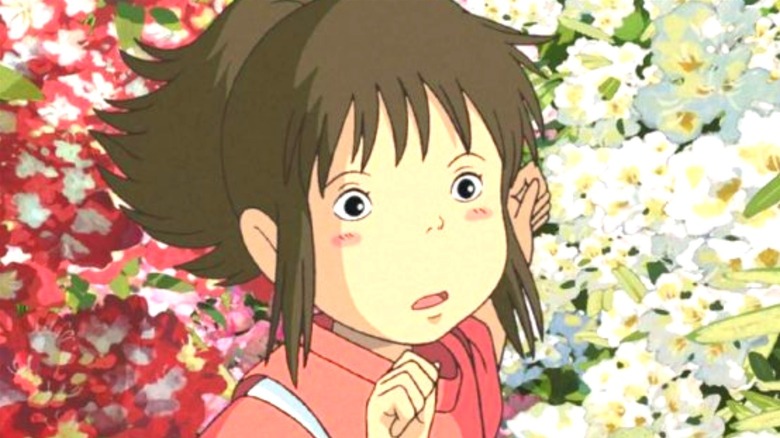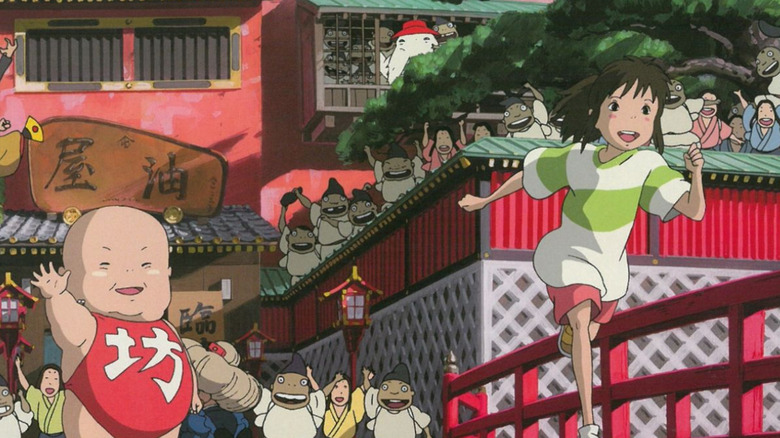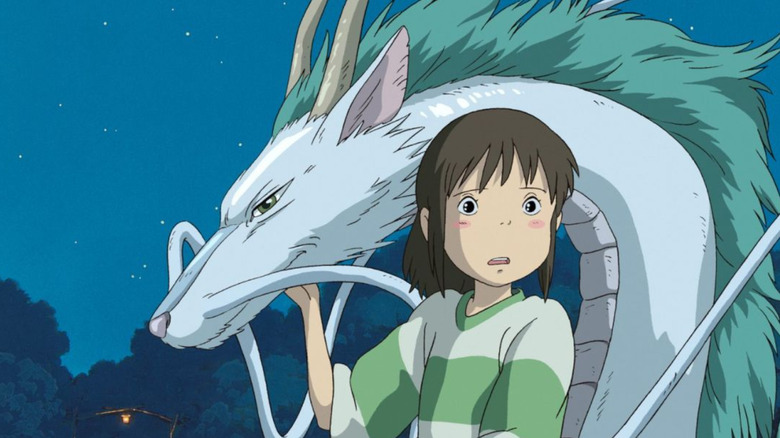The Ending Of Spirited Away Explained
It's fair to say that most adults, at least in the first world, probably feel they lived relatively safe childhoods. At least that's what many of them might say. But just because adults don't consider the dangers of childhood very threatening doesn't mean childhood isn't rife with risk. The world is a scary place, even for the children that adults protect with all of their strength.
Hands down, there are less than a handful of filmmakers who capture the danger and fear of childhood in their films. Perhaps the most notable of them is Studio Ghibli director Hayao Miyazaki, a man who has made his fair share of wondrous and fearful children's movies over the years. The mainstream world came to recognize his talent for making these uniquely symbolic kids' movies in the 1990s and 2000s, with his reputation truly cementing itself following the Academy Award won by his film "Spirited Away" at the 2003 Oscars (via BBC).
"Spirited Away" follows 10-year old Chihiro, a bitter and dejected girl in the midst of her family's relocation to a neighborhood far away from the one she knows. When her parents take a detour to an abandoned amusement park, Chihiro and her family are transported to the spirit realm before the latter are transformed into pigs. Stranded in the foreign world of the supernatural, Chihiro finds her only chance at returning home is to seek help at a nearby bathhouse.
To get her parents back, Chihiro must conquer the adult world
One thing about Ghibli movies is that there's never really one unifying moral or theme to take from the story. Not everything lines up perfectly to share a concise message. This is not to call it unfocused, but rather more concerned with causing a certain feeling in viewers. In "Spirited Away," that feeling is what it's like to be a young child in a strange, foreign, and ultimately adult world characterized by excess and greed.
For instance, upon their entry into the Spirit World, Chihiro's parents are turned into pigs after overindulging at a nearby food stand. Chihiro is subsequently forced to take on adult roles, landing a job at the nearby bathhouse at the cost of her full name. Now known as Sen, she is employed to cater to the needs of the bathhouse's insatiable guests. It is the farthest thing from a child-friendly environment there is.
Sen only escapes the Spirit World and regains her name by conquering her fear of the adult world. When she journeys to return a special golden seal to the witch Zeniba, she discovers something unexpected. Rather than another bitter old hag like Yubaba (Zeniba's twin who runs the bathhouse), Zeniba is more of a kindly grandmother, offering insight to the frightened Sen that shatters the conception that adulthood is just materialism. With newfound resolve and optimism, Sen is able to pass Yubaba's final test and return home with her parents.
It's also about recontextualizing one's past
In Studio Ghibli parlance, childhood is a time of freedom. The world is open, optimistic, and unrestrained. However, Chihiro embodies none of those characteristics at the start of the film. She is distraught at the idea of moving away, though her parents see it as an opportunity for her. Part of "Spirited Away" is about Chihiro realizing this herself. Compared to her time in the bathhouse, moving away becomes much more manageable and she ends the film with a more optimistic outlook on it.
This idea of recontextualizing the past is hammered home by another character named Haku. Originally introduced as Chihiro's first ally in the Spirit World, Haku seems to have a darker side to him as he knowingly follows the dastardly orders of Yubaba on occasion. This perception shatters, however, when Chihiro discovers that Haku is actually bound by a spell to do Yubaba's bidding. Like Chihiro, he too has lost part of his name and is stranded in the bathhouse.
Haku's freedom is granted when Chihiro breaks the spell midway through the film. He is further emancipated when Chihiro remembers something sudden and coincidental. Haku is the spirit of the Kohaku River, a being who once saved Chihiro when she fell into the river years prior. The river had since been destroyed, leaving Haku homeless and stranded. For both Chihiro and Haku, an understanding of the self and a reevaluation of the past is key in escaping the bathhouse.


